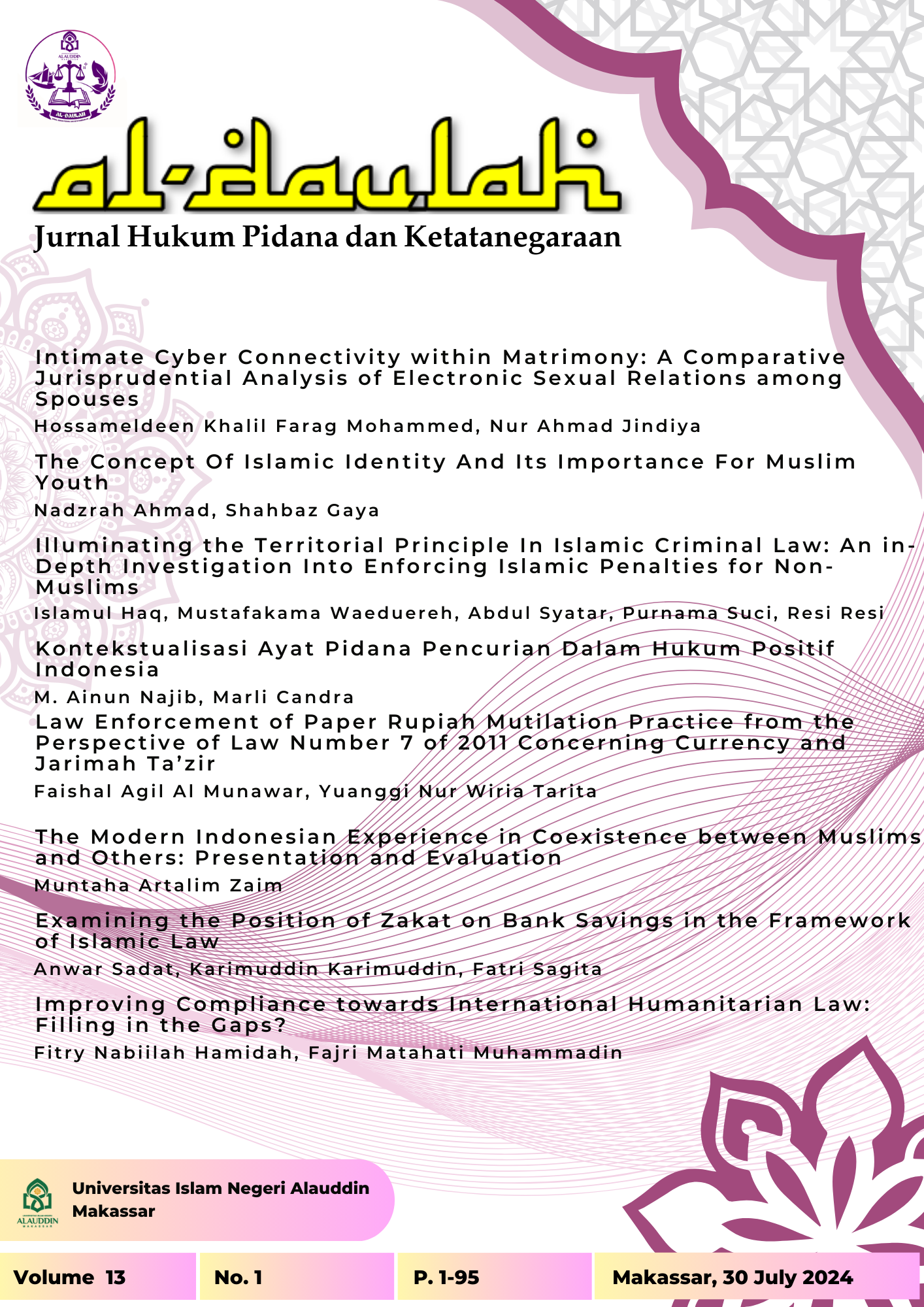Transformation of Prophetic Law in Pancasila Values Viewed from the Wadas Village Conflict
Abstract
The conflict that occurred in Wadas Village shows that the government uses a power approach and repressive measures. This is in line with the perspective of legal positivism. Therefore, legal positivism has been judged to be incompatible with legal developments in Indonesia, giving rise to new perspectives, one of which is prophetic law. The purpose of the reaserch was to determine the extent of the transformation of professional law contained in Pancasila and to find out in the development of law in Indonesia by looking at the cases that occurred in Wadas Village. This research used narrative qualitative type, in the form of stories, events, written and unwritten documents. The results of the study show that the essence of prophetic law is to make religious values an important part in building civilization. Prophetic law refers to the will of Allah SWT which was revealed through the Prophets and Rasul, the Mualim and Aulia who are always istiqomah and hold fast to the ilahiyah line or sunnatullah. The prophetic legal foundation in Pancasila, Pancasila is the objectification of Islam in Indonesia. This means that Islam is its objective form in the crystallization of Pancasila thought. In the context of the Wadas Village conflict, the government uses a professional paradigm that prioritizes the interests of the community and uses a persuasive approach that leads to common interests, in order to know the will of the residents with the aim of making joint decisions without the interests of the Wadas Village residents.
References
Book:
Abshori, et.al, Pemikiran Hukum Profetik: Ragam Paradigma Menuju Hukum Berketuhanan,Yogyakarta: Ruas Media, 2018.
Affandi, Hernadi, Pancasila Eksistensi dan Aktualisasi, Yogyakarta: Andi, 2020.
Ahimsa-Putra, Heddy Shri, Paradigma Profetik Islam, Yogyakarta: UGM Press, 2017.
Asshiddiqie, Jimly, Konstitusi dan Konstitisonalisme Indonesia, Jakarta: Sinar Bakti, 2009.
Azhary, M. Tahir, Negara Hukum Suatu Studi tentang Prinsip-prinsipnya dilihat dari Segi Hukum Islam Implementasinya pada Periode Negara Madinah dan Masa Kini, Pranada: Jakarta, 2015.
Dimyati, Khudzaifah, Pemikiran Hukum: Sebuah Konstruksi Epistemologi dalam Pemikiaran Berbasis Nilai Budaya Hukum Indonesia, Yogyakarta: Genta Publishing, 2013.
Latif, Yudi Negara Paripurna Historisitas, Rasionalitas, dan Aktualitas Pancasila, Jakarta: Gramedia, 2015
Menski, Werner, Comparative Law in a Global Context, (United Kingdom: Cambridge University Press, 2008), diterjemahkan M. Khozim, Werner Menski, Perbandingan Hukum dalam Konteks Global Sistem Eropa, Asia, dan Afrika, Bandung: Nusa Media, 2012.
Purwanti, Ani (editor), Konstruksi Hukum dalam Perspektif Spiritual Pluralistik, Yogyakarta: Thafa Media, 2021.
Thontowi, Jawahir, Mazhab Tamsis: Teori Hukum Inklusif, Yogyakarta: FH UII, 2017.
Thontowi, Jawahir Pancasila dalam Perspektif Hukum Pandangan Terhadap Ancaman “The Lost Generation”, Yogyakarta: UII Press, 2016.
Syamsudin, M. (Editor), Ilmu Hukum Profetik, Yogyakarta: FH UII Press, 2013.
Journal Article /Website:
Dictionary.com, https://www.dictionary.com/browse/prophetic, diakeses 27 Februari 2022
Farisa, Fitria Chusna, Awal Mula Warga Wadas Melawan, Tolak Tambang untuk Proyek Bendungan Bener, Kompas 09 Februari 2022, https://nasional.kompas.com/read/2022/02/09/17020441/awal-mula-warga-wadas-melawan-tolak-tambang-batu-andesit-untuk-proyek?page=all, diakses 25 Februari 2022.
Hendarto, Yohanes Mega, Isu Wadas, dari Bendungan Sampai Ganjar Pranowo, Kompas 19 Februari 2022 https://www.kompas.id/baca/linimasa/2022/02/18/isu-wadas-dari-bendungan-sampai-ganjar-pranowo, diakses 19 Februari 2022
Hidayat, Arief, Negara Hukum Berwatak Pancasila, Makalah disampaikan Seminar Nasional dalam Rangka Pekan Fakultas Hukum 2017 Universitas Atma Jaya Yogyakarta.
MD, Moh. Mahfud, Berhukum Pancasila, Koran Sindo 21 April 2018, https://nasional.sindonews.com/berita/1299607/18/berhukum-pancasila, diakses 03 Maret 2022.
Soemarsono, Maleha, “Negara Hukum Indonesia Ditinjau dari Sudut Teori Tujuan Negara”, Jurnal Hukum dan Pembangunan, Nomor 2 April-Juni 2007.
Susanto, Heri, “Reinterpretasi dan Revitalisasi Pancasila sebagai Landasan Filosofis Pengembangan Ilmu Sosial: Studi Kasus Pemikiran Notogoro, Mubyarto, dan Kuntowijoyo)”, Proceeding Kongres Pancasila III, Harapan, Peluang, dan Tantangan Pembudayaan Nilai-nilai Pancasila, Universitas Airlangga.
Satriawan, Iwan, et.al, “Pencegahan Gerakan Radikalisme melalui Penanaman Ideologi Pancasila dan Budaya Sadar Konstitusi Berbasis Komunitas”, Jurnal Surya Masyarakat, Volume 1 Nomor 2 Mei 2019.
Reategui, Ruben Mendez dan Oscar Sumar Albujar, “Rule of Law versus Soft Rule of Law”, Revista de Derecho Político, Nomor 109, September-Desember 2020.
Rohman, M. Saifullah “Kandungan Nilai-nilai Syariat Islam dalam Pancasila”, Millah Volume XIII, Nomor 1 Agustus 2013.
Tamanaha, Brian Z. “A Concise Guide to Rule of Law”, Legal Studies Research Paper Series, September 2007.
Thontowi, Jawahir, “Paradigma Profetik dalam Pengajaran dan Penelitian Ilmu Hukum” Jurnal Ilmu-ilmu Sosial, Unisia, Volume XXXIV No. 76 Januari 2012,
WJP Rule of Law Index, https://worldjusticeproject.org/rule-of-law-index/factors/2021/, diakses 8 Maret 2022.
Zoelva, Hamdan, “Relasi Islam, Negara, dan Pancasila dalam Perspektif Tata Hukum Indonesia” Jurnal Syariah dan Hukum, Volume 4 Nomor 2, Desember 2012.
The authors of a work hold the copyright and grant the Al-Daulah: Jurnal Hukum Pidana dan Ketatanegaraan the right of first publication. The work is also licensed under the Creative Commons Attribution License (CC BY 4.0), which enables others to share the work while acknowledging the authorship and initial publication in the journal. The authors can make separate contractual agreements for the non-exclusive distribution of the published version of the work, such as by posting it to an institutional repository or editing it for a book, with an acknowledgment of its initial publication in this journal. Authors are allowed and encouraged to post their work online, such as in institutional repositories or on their website, before and during the submission process. This can lead to productive exchanges and greater citation of the published work.


